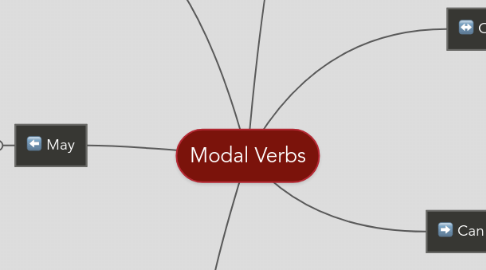
1. Could
1.1. Used to express ability in the past and to express politeness.
1.1.1. Affirmative: Subjet + Could + Verb
1.1.1.1. I could talk louder.
1.1.2. Negative: Subjet + Couldn't + Verb
1.1.2.1. I couldn’t talk louder.
1.1.3. Interrogative: Could + Subjet + Verb
1.1.3.1. Could you talk louder?
2. Might
2.1. The Might auxiliary verb is used to express possibility. It is a possibility or present or future, and the verb that follows is infinitive.
2.1.1. Affirmative: subject + might + verb
2.1.1.1. I might lose my job.
2.1.2. Negative: subject + might not + verb
2.1.2.1. We might not know everything.
2.1.3. Question: might + subejct + verb + ?
2.1.3.1. Might I give you a piece of advice?
2.1.4. Have: subject + might + have + participle
2.1.4.1. They might have arrived now
3. May
3.1. The verb 'MAY is used to express a certain degree of probability of an action or certainty:
3.1.1. Affirmative: subject + may + verb
3.1.1.1. You may ask three questions.
3.1.2. Negative: subject + may+ verb
3.1.2.1. I may not come next week.
3.1.3. Question: may + subejct + verb + ?
3.1.3.1. May I go to the bathroom?
3.1.4. Have: subject + may + have + participle
3.1.4.1. I may have done something wrong
4. Have to
4.1. Used to express certainty, necessity, and obligation.
4.1.1. Affirmative: subject + have/has to + verb
4.1.1.1. I have to study for the exam
4.1.2. Question: Do/does + subject + have to + verb + ?
4.1.2.1. Does she have to study?
4.1.3. Negative: subject + don't/doesn't have to + verb
4.1.3.1. I don't have to study for the exam
5. Ought to
5.1. Used to advise or make recommendations.
5.1.1. Affirmative: subject + ought to + verb
5.1.1.1. You ought to stop smoking
5.1.2. Negative: subject + ought not/oughtn't + verb
5.1.2.1. You ought not smoke so much
5.1.3. Question: ought + subejct + verb + ?
5.1.3.1. Ought I stop smoking here?
6. Can
6.1. The verb 'Can' belongs to modal verbs and is located before the main verb in infinitive.
6.1.1. Affirmative: Subjet + Can + Verb
6.1.1.1. Mary can be very stubborn sometimes.
6.1.2. Negative: Subjet + Can not /Cannot/ Can't + Verb
6.1.2.1. You can't tell me what to do.
6.1.3. Interrogative: Can + Subjet + Verb
6.1.3.1. Can Peter speak German?
